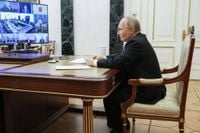The ongoing conflict between Russia and Ukraine witnessed a significant development recently, signaling potential shifts in the diplomatic landscape of the region. After extensive negotiations held in Riyadh, Saudi Arabia, on March 24 and 25, 2025, the United States facilitated discussions between the two nations aimed at establishing a truce in the Black Sea. The result is a commitment from both Russia and Ukraine to cease hostilities in these strategically important waters.
The U.S. is taking a proactive role by promoting measures to ensure navigation safety and prevent the misuse of commercial vessels for military purposes in the area. As stated by the White House, both countries have agreed to "ensure the safety of navigation, eliminate the use of force, and prevent the use of commercial ships for military objectives in the Black Sea." Ukrainian Defense Minister Rustem Umerov emphasized that any movement of Russian warships outside certain designated areas would be deemed a violation of this agreement. Moreover, he cautioned that Ukraine would retain the right to defend itself in this scenario, highlighting the fraught tension that still persists despite the agreement.
These discussions are crucial as they also touch on broader issues of economic cooperation. Amidst international sanctions, the U.S. has pledged to aid Russia in re-establishing access to global markets, particularly for agricultural exports and fertilizers. This was a significant demand from Moscow, which has faced crippling restrictions affecting its economy since the onset of the war. According to reports, the Kremlin has specified that any agreements made will be contingent upon easing these sanctions, particularly those impacting the state agricultural bank and other exporters.
President Volodymyr Zelensky remarked on the agreement's implications, expressing Ukraine’s readiness to implement it while firmly rejecting any weakening of sanctions on Russia. “We will commit fully to these agreements, but any moves to diminish international restrictions against Russia will not be accepted,” he stated. Zelensky's administration is navigating a delicate path, aiming to engage with international partners while remaining steadfast in its demands to uphold sanctions against Russia.
In another significant announcement, Zelensky indicated that both he and U.S. officials agreed to involve third-party nations in monitoring a potential ceasefire. This approach could alleviate some concerns about compliance and enforcement, a critical element given the trust deficit that exists between the conflicting parties. The stated intention to bring in external monitors, possibly from European countries or Turkey, demonstrates an effort to establish a more structured and verifiable truce mechanism.
Despite the optimism surrounding the maritime ceasefire, both sides remain distant on achieving a general ceasefire. Ukraine's readiness for an unconditional ceasefire contrasts sharply with Russia’s strategic positioning; President Vladimir Putin's troop actions continue on the ground, with reports of Russian advances even amid ongoing peace talks. Observers have noted that Putin seems to leverage military gains to strengthen his negotiating position, complicating the prospect of a comprehensive ceasefire.
The U.S.'s commitment to facilitating peace in the region is evident, with former President Donald Trump stating his belief that Russia desires an end to the conflict, though he acknowledges that Moscow may not act swiftly. Trump’s perspective reflects a nuanced understanding of the geopolitical dynamics at play, particularly how Russia is attempting to balance international perceptions with its security interests.
In the wake of the agreement, the French presidency stated the truce “goes in the right direction” but is “insufficient” for a lasting ceasefire. This sentiment encapsulates the frustration felt by European leaders who remain skeptical about Russia's intentions and the efficacy of any agreed terms without robust verification. A French official highlighted that while discussions on energy infrastructure and a potential maritime ceasefire are steps forward, they fall short of establishing what is needed for a durable resolution.
As these negotiations unfold, they occur against the backdrop of other troubling incidents related to the Ukraine conflict. Reports of civilian casualties and military engagements continue to arise, with recent strikes resulting in injuries among civilians in both nations, underscoring the wreckage the war has wrought on everyday lives.
In conclusion, the ceasefire agreement in the Black Sea marks a stepping stone in the long and complex path towards resolving the conflict between Russia and Ukraine. Both nations have indicated a willingness to engage in dialogue, yet their divergent goals and the external influences surrounding negotiations will likely continue to pose formidable challenges. The cooperative engagements by the U.S. and allied nations will be pivotal in shaping the forthcoming conversations and overseeing compliance with any agreements made. The unfolding situation remains dynamic and unpredictable, echoing the partnership's fragility even as hopes for peace persist.









